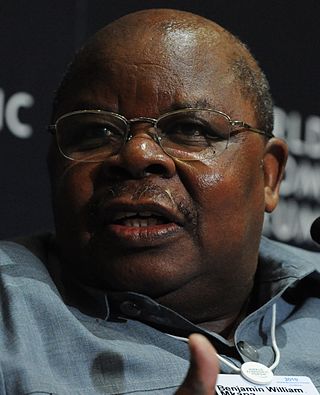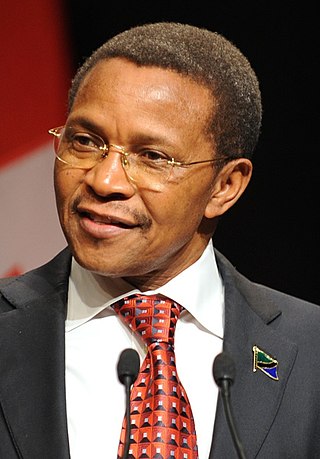Related Research Articles

Tanzania, officially the United Republic of Tanzania, is a country in East Africa within the African Great Lakes region. It borders Uganda to the north; Kenya to the northeast; the Indian Ocean to the east; Mozambique and Malawi to the south; Zambia to the southwest; and Rwanda, Burundi, and the Democratic Republic of the Congo to the west. Mount Kilimanjaro, Africa's highest mountain, is in northeastern Tanzania. According to the 2022 national census, Tanzania has a population of nearly 62 million, making it the most populous country located entirely south of the equator.
The politics of Tanzania takes place in a framework of a unitary presidential democratic republic, whereby the President of Tanzania is both head of state and head of government, and of a multi-party system. Executive power is exercised by the government. Legislative power is vested in both the government and parliament. The party system is dominated by the Chama Cha Mapinduzi. The Judiciary is independent of the executive and the legislature.

Benjamin William Mkapa was the third president of Tanzania, in office from 1995 to 2005. He was Chairman of the Revolutionary State Political Party.

Julius Kambarage Nyerere was a Tanzanian anti-colonial activist, politician and political theorist. He governed Tanganyika as prime minister from 1961 to 1962 and then as president from 1962 to 1964, after which he led its successor state, Tanzania, as president from 1964 to 1985. He was a founding member and chair of the Tanganyika African National Union (TANU) party, and of its successor Chama Cha Mapinduzi, from 1954 to 1990. Ideologically an African nationalist and African socialist, he promoted a political philosophy known as Ujamaa.

Ali Hassan Mwinyi was a Tanzanian politician who served as the second president of the United Republic of Tanzania from 1985 to 1995. Previous posts included Minister for Home Affairs and Vice President. He also was chairman of the ruling party, the Chama Cha Mapinduzi (CCM) from 1990 to 1996.

The Civic United Front is a liberal party in Tanzania. Although nationally based, most of the CUF's support comes from the Zanzibar islands of Unguja and Pemba. The party is a member of Liberal International.

Jakaya Mrisho Kikwete is a Tanzanian politician who was the fourth president of Tanzania, in office from 2005 to 2015.

Constitution of Nepal 2015 is the present governing Constitution of Nepal. Nepal is governed according to the Constitution which came into effect on 20 September 2015, replacing the Interim Constitution of 2007. The constitution of Nepal is divided into 35 parts, 308 Articles and 9 Schedules.
A major party is a political party that holds substantial influence in a country's politics, standing in contrast to a minor party.
This is a list of the federal institutions of Tanzania.

The Constitution of the United Republic of Tanzania, also known as the Permanent Constitution, was ratified in 16 March 1977. Before the current establishment, Tanzania has had three constitutions: the Independence Constitution (1961), the Republican Constitution (1962), and the Interim Constitution of the United Republic of Tanganyika and Zanzibar (1964).

The Chama Cha Mapinduzi is the dominant ruling party in Tanzania and the second longest-ruling party in Africa, only after the True Whig Party of Liberia. It was formed in 1977, following the merger of the Tanganyika African National Union (TANU) and the Afro-Shirazi Party (ASP), which were the sole operating parties in mainland Tanzania and the semi-autonomous islands of Zanzibar, respectively.

Hussein Ali Mwinyi is the 8th president of Zanzibar. The son of former Tanzanian president Ali Hasan Mwinyi, he is a member of the Chama Cha Mapinduzi (CCM) political party.

Kassim Majaliwa Majaliwa is a Tanzanian politician who has been the 12 Prime Minister of Tanzania since 2015. He was appointed by President John Magufuli after the 2015 general election. He is a member of the ruling Chama Cha Mapinduzi party and has been a Member of Parliament for Ruangwa
General elections were held in Tanzania on 25 October 2015. Voters elected the president, members of Parliament, and local government councillors. By convention, the election was held on the last Sunday of October and was supervised by the National Electoral Commission (NEC). Political campaigns commenced on 22 August and ceased a day before the elections.
General elections were held in Tanzania on 28 October 2020 to elect the President and members of National Assembly. The presidential election was won by incumbent John Magufuli of the Chama Cha Mapinduzi party.
Barnabas Albert Samatta is a retired Tanzanian lawyer and judge who was Chief Justice of Tanzania from 2000 to 2007.
Augustine Saidi, or Augustino B. Saidi, was a Tanzanian lawyer who was the first African Chief Justice of Tanzania.
References
- ↑ "Nyalali Commission recommends restoration of multi-party politics". The Citizen. 1 November 2020. Retrieved 6 September 2023.